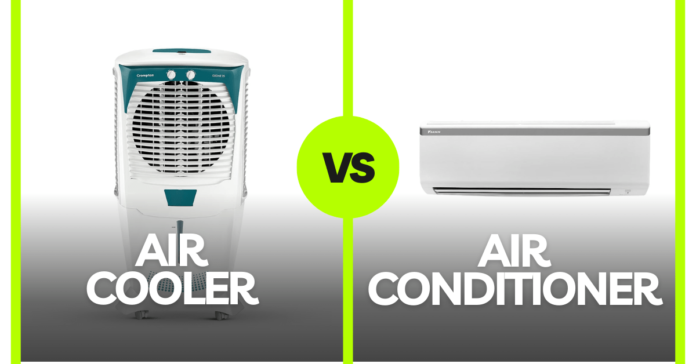Introduction to Air Cooler vs Air Conditioner
As the mercury rises, the quest for the perfect cooling solution becomes paramount. In the realm of cooling appliances, two contenders stand out – the traditional air cooler and the modern air conditioner. Both have their merits and drawbacks, making the choice a nuanced decision. In this blog, we will delve into the intricacies of the air cooler vs air conditioner debate, providing a comprehensive guide to help you make an informed decision.
Understanding the Basics: Air Cooler vs Air Conditioner
Before we dive into the nitty-gritty details, let’s start with a brief overview of how these two cooling systems operate.
Air Cooler
Air coolers, also known as evaporative coolers, work on a simple principle of evaporation. These appliances draw warm air through water-saturated pads, causing the water to evaporate and cool the air. The cooled air is then circulated into the living space, providing a refreshing breeze.
Air Conditioner
Air conditioners, on the other hand, use a more complex refrigeration cycle to cool the air. They remove warm air from the room, cool it by passing it over refrigerant coils, and then circulate the cooled air back into the space. Additionally, air conditioners dehumidify the air, making them effective in humid conditions.
Comparison Table: Air Cooler vs Air Conditioner
Let’s break down the differences between air cooler vs air conditioners in a comprehensive table:
| Criteria | Air Cooler | Air Conditioner |
|---|---|---|
| Cooling Mechanism | Evaporative cooling | Refrigeration cycle |
| Energy Efficiency | Generally more energy-efficient | Consumes more energy |
| Initial Cost | Lower upfront cost | Higher initial investment |
| Operating Cost | Lower operational cost | Higher electricity bills |
| Installation | Easy installation | Requires professional installation |
| Maintenance | Low maintenance | Regular maintenance needed |
| Humidity Control | Adds moisture to the air | Dehumidifies the air |
| Cooling Effectiveness | Ideal for dry climates | Effective in both dry and humid conditions |
| Environmental Impact | Environmentally friendly | Greater environmental impact due to refrigerants |
| Portability | Portable and easy to move | Fixed units, not easily movable |
| Noise Level | Generally quieter | May produce more noise |
| Longevity | Longer lifespan | Shorter lifespan |
Check more about the best Air Coolers and Air Conditioners
Frequently Asked Questions
Q1. Which is more cost-effective in the long run?
A: It depends on factors such as your local climate, usage, and electricity costs. While air coolers have lower operational costs, air conditioners may be more efficient in certain situations.
Q2. Are air conditioners better for humid climates?
A: Yes, air conditioners excel in humid conditions as they not only cool but also dehumidify the air. Air coolers, however, may struggle in high humidity.
Q3. Can I use an air cooler and an air conditioner together?
A: It is not recommended to use them together in the same space, as they have conflicting cooling mechanisms and may hinder each other’s performance.
Q4. Which is more eco-friendly?
A: Air coolers are generally considered more environmentally friendly due to their lower energy consumption and the absence of refrigerants.
Q5. Can I install an air conditioner without professional help?
A: Installing an air conditioner is a complex task that typically requires professional assistance to ensure proper functioning and efficiency.
Q6. Do air coolers consume a lot of water?
A: While air coolers do use water for the cooling process, the consumption is relatively low. The water consumption depends on factors like the size of the cooler and usage patterns.
Making the Decision: What’s Right for You?
Choosing between an air cooler vs air conditioner ultimately comes down to your specific needs, budget, and local climate. If you live in a dry climate with lower humidity levels and are looking for an energy-efficient, cost-effective solution, an air cooler might be the right choice. On the other hand, if you need powerful cooling in a humid environment and are willing to invest more upfront and in energy bills, an air conditioner could be the better option.
Consider factors such as initial and operational costs, environmental impact, ease of installation, and long-term maintenance. Additionally, think about your cooling preferences – whether you prefer a natural breeze with added moisture or a controlled, dehumidified environment.
In conclusion, the air cooler vs air conditioner debate is not a one-size-fits-all situation. Each has its strengths and weaknesses, and the key is to find the one that aligns with your specific requirements. So, whether you’re chasing the nostalgic charm of a gentle breeze or the frosty coolness of modern technology, make your decision wisely, and stay cool in the heat!
Learn more about all our reviews on Electronics.
